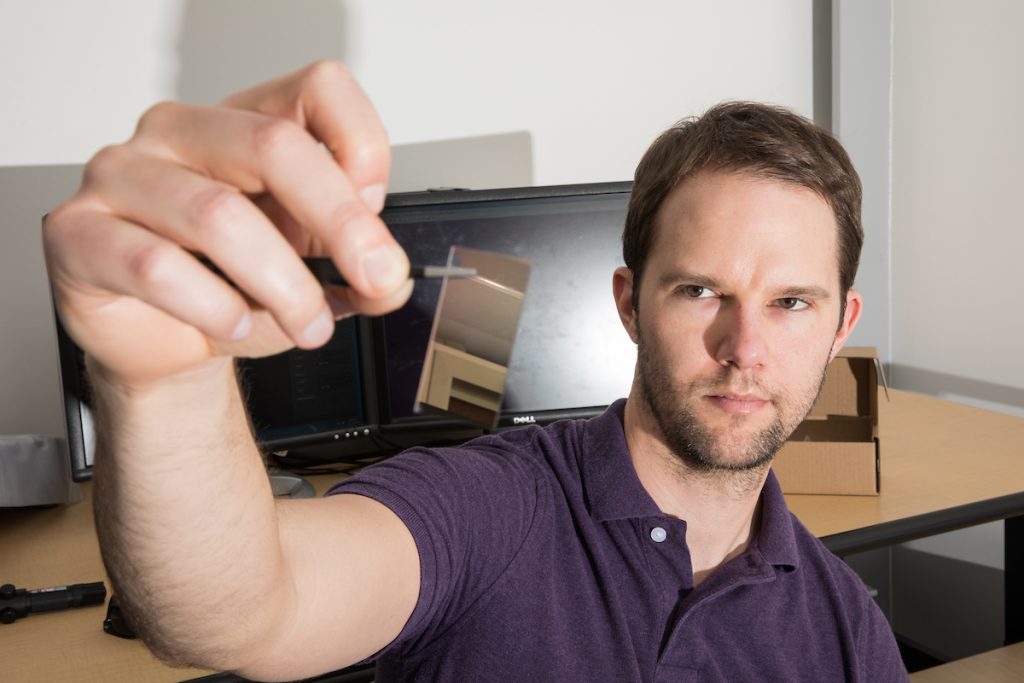
By Julie Hammonds
Office of the Vice President for Research
A Northern Arizona University physicist who studies complex, hybrid nanomaterials has been recognized for his academic leadership and the quality and innovation of his research. The Research Corporation for Science Advancement (RCSA) recently named assistant professor John Gibbs a 2018 Cottrell Scholar. This award includes a three-year, $100,000 grant to advance his teaching and research.
One of only 24 early-career teacher-scholars selected nationally from the fields of chemistry, physics and astronomy—and the first from NAU—Gibbs was chosen for his proposal to study the fundamental principles of active matter, “Investigating Shape-Dependent Emergent Collective Behavior in Artificial Active Matter Systems.”
Building on earlier research
Gibbs prepared the foundation for this new project with earlier studies on the movement of microscopic particles suspended in fluids.
“In this field, we’re looking at how active microscale particles travel from one point to another, and we’re trying to propel them in a controlled manner,” Gibbs said. “Understanding and controlling the behavior of matter at the microscopic level may someday change how we respond to oil spills, assemble new materials or perform microsurgery.”
Gibbs recently contributed to a study of how shape affects the behavior of microparticles composed of titanium dioxide, a light-sensitive photocatalyst. The study concluded that geometry significantly affected movement, opening a new avenue for advanced motion control. The resulting paper was recently published in ACS Applied Materials and Interfaces. Gibbs also was the principal investigator and corresponding author of a 2017 paper published in Advanced Materials, a top-five materials science journal, on a novel method to manipulate particle-particle interactions.
“This new project will build on what we learned in these earlier studies,” Gibbs said. “We will look at how large numbers of active particles show emergent behaviors, which are phenomena only seen when many mobile particles interact with simple but well-defined rules. The hope is that we’ll gain a better understanding of how such systems behave, knowledge we can use for practical applications. On a larger scale, we expect to discover new materials with unprecedented properties that emerge from these simpler pieces.”
Preparing future scientists
In the experimental lab next to his office, students will observe particle behavior through a microscope, take video and collect and analyze data. More advanced students will build the actual particles used in the experiments.
“This project is ideal for introducing students to research,” Gibbs said.
With the funding he receives from RCSA, Gibbs will also develop a new course to launch graduate students into successful scientific careers.
“The new course will cover what scientists actually do, including writing proposals and managing labs,” Gibbs said. “These things aren’t often taught in traditional programs, but NAU has a significant focus on developing working scientists.”
RCSA funds scientific research and the development of academic scientists. To be eligible for the award, an applicant must be in his or her third year as an assistant professor. Gibbs joined the faculty of NAU’s Department of Physics and Astronomy in 2014. He is an affiliated faculty member of the Center for Bioengineering Innovation and is affiliated with the School of Informatics, Computing, and Cyber Systems. Gibbs’ research interests cover the physics and applications of nanomaterials, including optical and mechanical properties, metamaterials and propulsion at the nanoscale.
Source: NAU physicist receives prestigious 2018 Cottrell Scholar Award